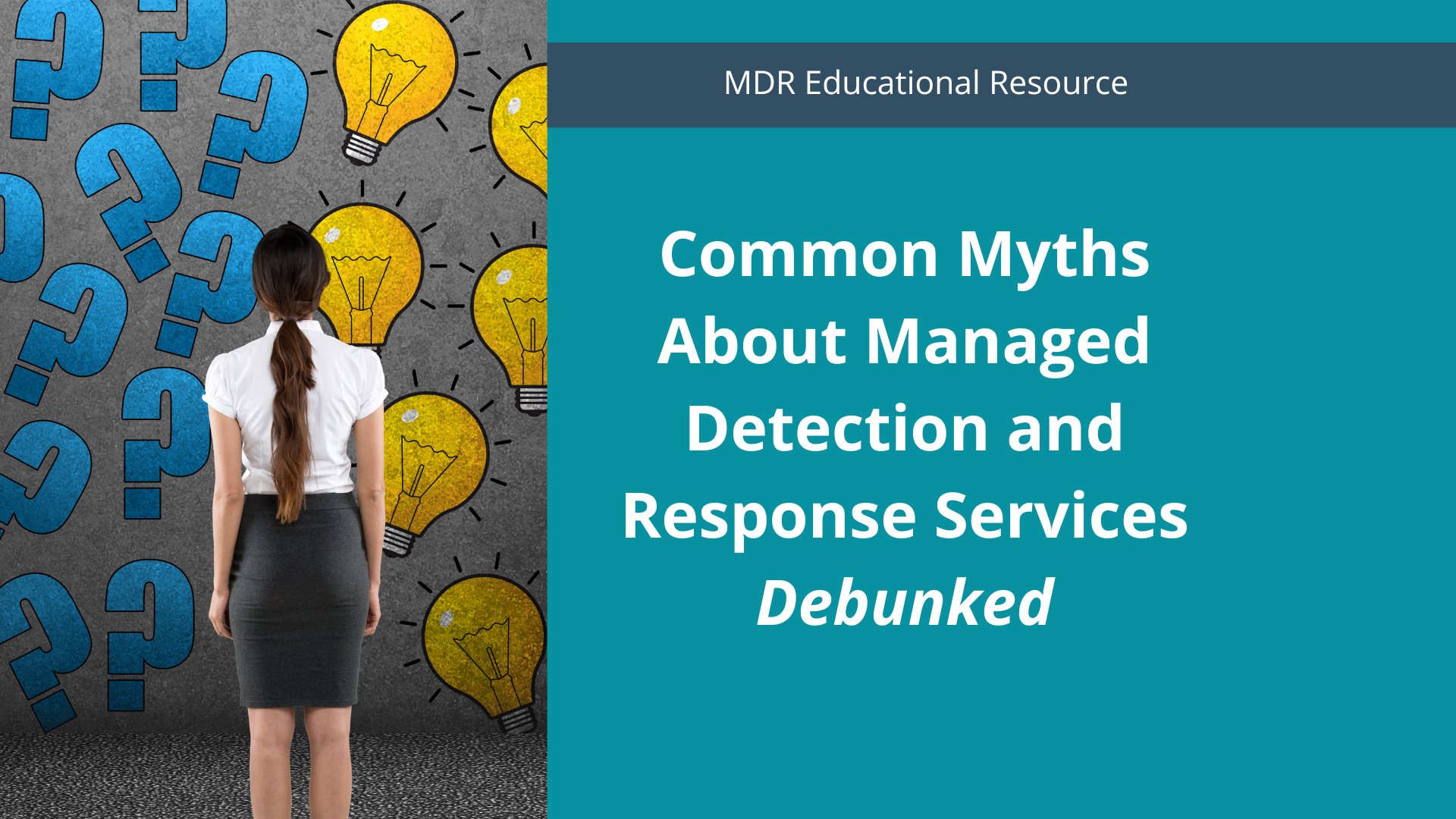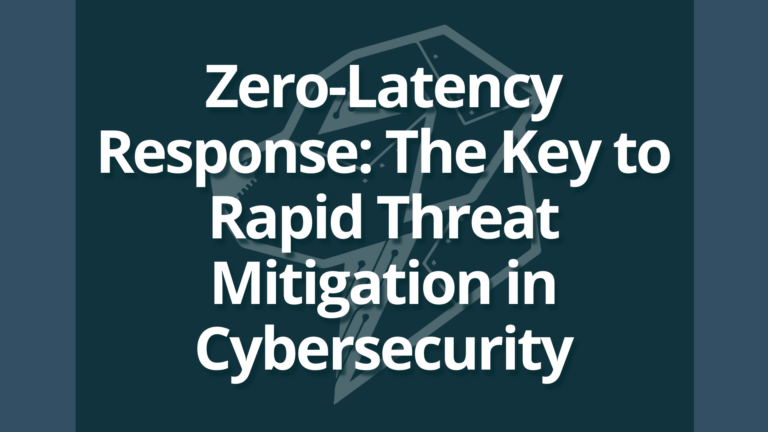Managed Detection and Response (MDR) solutions have become an essential component of cybersecurity strategies for businesses. However, there are several common myths surrounding these solutions that need to be debunked.
Despite its increasing popularity, there are still various common misconceptions regarding MDR services which can make it difficult for organizations to decide whether they should invest in them.
By examining the truth behind these myths and understanding how MDR solutions can benefit businesses, organizations can make informed decisions when implementing effective cybersecurity measures.
It is important to choose the right MDR solution tailored to specific requirements to ensure optimal protection against emerging threats in today’s ever-evolving digital landscape.
Myth #1: “MDR services are only for large enterprises”
MDR services can help businesses of different sizes, not just large ones. They are designed to find and respond to threats in a proactive way. They use advanced technology and security experts to detect and respond to cyber threats effectively.
Small and medium-sized businesses (SMBs) can also benefit from MDR, even though they may have fewer resources or a big attack surface to protect. SMBs often face similar cybersecurity risks but may not have a dedicated security team.
By using an MDR service, SMBs can improve their security, get specialized security knowledge, and receive alerts and guidance during security incidents. There are now more services available for smaller businesses, so they can have good security without spending a lot of money upfront on equipment and staff.
The myth that MDR services are exclusively tailored for large corporations is unfounded and fails to acknowledge the applicability of these solutions across organizations of varying sizes.
MDR solutions provide valuable assistance to organizations, regardless of their size, by offering access to security experts who specialize in information security and enterprise cybersecurity. These services enable smaller organizations to benefit from advanced threat detection and response capabilities, without the need for a dedicated internal team.
Myth #2: “MDR services are too expensive”
Contrary to popular belief, the cost of MDR services is often justified by their effectiveness in detecting and responding to cyber threats.
While it may seem that MDR services are expensive, they provide a comprehensive solution that includes advanced threat detection tools, expert analysts, and 24/7 monitoring.
This level of protection is crucial for businesses of all sizes to mitigate the potential financial losses and reputational damage caused by cyberattacks.
MDR services can:
- Offer a more cost-effective choice compared to building and maintaining an in-house security team, especially for small and medium-sized businesses (SMBs)
- Access to security experts and advanced technology without requiring large upfront investments
- Help prevent and minimize the impact of cyber incidents, which can be costly in terms of finances, reputation, and trust
It’s crucial to evaluate organizational needs, conduct a cost-benefit analysis, and discuss pricing models with multiple service providers to determine the most suitable option.
Myth #3: “MDR services are only for businesses with complex security needs”
Another misconception surrounding MDR services is the notion that they are solely tailored for organizations with intricate security requirements. However, this is a myth that needs to be debunked.
MDR services are not limited to businesses with complex security needs; they can benefit organizations of all sizes and industries. Whether an organization has basic or advanced security needs, MDR services provide proactive threat detection and response capabilities that can enhance their overall security posture.
Companies of all sizes and shapes, regardless of the Tech stack and volume of potential threats, can benefit from this.
SMBs face similar cybersecurity risks but may not have the expertise or resources to handle security on their own. MDR services give SMBs access to special security knowledge, advanced technology, and constant monitoring without needing to invest upfront in order to develop an in-house security team to handle the workload.
The decision to use these services should depend on the specific needs, risks, and resources of your business, not just how complicated you think your security is. These services can be really helpful for any business, making them more secure and ready to handle cyber threats.
Myth #4: “MDR services are a one-size-fits-all solution”
One misconception to address is the belief that MDR services offer a uniform solution for all organizations. This myth suggests that MDR services are a one-size-fits-all solution. However, this is not the case.
MDR providers tailor their services to meet the specific needs and requirements of each organization. They consider factors such as industry, size, risk profile, and existing security infrastructure.
MDR service providers work closely with their clients to create a customized plan that fits their specific requirements.
An assessment of the organization’s environment, security goals, and compliance obligations should be done first in order to develop a tailored approach that includes monitoring, incident response, integration with existing security tools, and clear communication.
It’s important to remember that MDR services are just one part of a broader security strategy, working alongside other security measures to provide comprehensive protection.
Myth #5: “MDR services can replace in-house IT and security teams”
MDR services work alongside in-house IT and security teams instead of replacing them.
MDR service providers collaborate with internal teams, acting as an extension of the organization’s security operations. MDR services have dedicated experts who are skilled in detecting threats, responding to incidents, and monitoring systems.
The teams can scale their support based on the organization’s needs and assist with any level of incident or situation – big or small.
By outsourcing certain security tasks to these services, in-house teams can focus on their core responsibilities while leveraging the expertise of the MDR service provider.
Additionally, these services offer 24/7 coverage, ensuring that security incidents are promptly addressed. Clear communication and collaboration between internal teams and the MDR service provider are essential to maximize the effectiveness of the security program.
MDR services complement in-house IT by providing specialized expertise.
- In-house teams possess organizational knowledge and can address unique challenges.
- Collaboration between MDR services and in-house teams enhances threat detection and response capabilities.
- In-house teams provide context-specific insights that enable effective decision-making.
MDR services should be seen as a valuable addition to in-house IT and security teams, rather than a replacement.
The Truth about MDR Solutions
MDR solutions offer several advantages compared to traditional cybersecurity approaches.
Firstly, MDR provides 24/7 monitoring, allowing for continuous threat detection and response. This proactive approach ensures that potential security incidents are identified and addressed promptly, minimizing the risk of data breaches or other cyberattacks.
Additionally, MDR offers flexibility in deployment options, accommodating different organizational needs and requirements. Whether it is on-premises, cloud-based, or hybrid environments, MDR can adapt to provide effective protection across various infrastructures.
MDR vs. traditional cybersecurity
Traditional cybersecurity approaches often lack the real-time detection and response capabilities provided by MDR solutions, making them less effective in identifying and mitigating sophisticated threats.
MDR solutions offer several advantages over traditional cybersecurity methods, including:
- Continuous monitoring and analysis of network activity
- Advanced threat intelligence and analytics
- Rapid incident response and containment
By leveraging these features, MDR solutions enhance an organization’s ability to detect, respond to, and recover from cyber threats more effectively than traditional approaches.
Benefits of 24/7 monitoring
Continuous monitoring and analysis of network activity provides organizations with valuable insights into potential security vulnerabilities, enabling proactive threat identification and timely response to mitigate risks.
24/7 monitoring offered by Managed Detection Response (MDR) solutions ensures that any suspicious behavior or anomalies are immediately detected, allowing for swift action. This constant vigilance reduces the likelihood of successful cyberattacks and minimizes the potential impact on an organization’s systems, data, and reputation.
Dispelling myths surrounding MDR solutions highlights the benefits of this comprehensive approach to cybersecurity.
Flexibility in deployment options
By offering multiple deployment options, organizations can tailor their cybersecurity solutions to their specific needs and environment, ensuring maximum flexibility and effectiveness in safeguarding their systems and data.
- Deployment options include on-premises, cloud-based, or hybrid solutions.
- On-premises deployments provide organizations with complete control over their infrastructure.
- Cloud-based deployments offer scalability and cost-efficiency.
- Hybrid deployments combine the benefits of both on-premises and cloud-based solutions.
- These diverse options debunk the myth that MDR solutions are limited in terms of deployment flexibility.
Implementing Managed Detection and Response Services
Let’s take a look at the key points of implementing Managed Detection and Response (MDR) services.
Firstly, it compares different deployment options for MDR solutions to provide a comprehensive understanding of their pros and cons.
Secondly, it highlights the benefits of 24/7 coverage offered by MDR services in identifying and responding to security incidents promptly.
Lastly, it emphasizes the crucial role played by MDR in cybersecurity by augmenting organizations’ capabilities in threat detection, incident response, and overall risk management.
Deployment options comparison
In comparing deployment options for managed detection and response (MDR) solutions, it is informative to examine their various features and capabilities. When considering different deployment options, organizations should consider the following factors:
- On-Premises Deployment: This option allows for complete control over data and infrastructure but requires significant upfront investment in hardware and maintenance.
- Cloud-Based Deployment: Provides scalability, flexibility, and reduced maintenance costs but may raise concerns about data security and privacy.
- Hybrid Deployment: Offers a combination of on-premises and cloud-based deployment, providing a balance between control and flexibility while addressing specific organizational needs.
These deployment options vary in terms of cost, control, scalability, and security considerations that organizations need to evaluate before choosing an MDR solution.
Benefits of 24/7 coverage
24/7 coverage provides organizations with uninterrupted monitoring and response capabilities. This ensures prompt detection and mitigation of potential security threats. By maintaining constant vigilance, managed detection and response (MDR) solutions can quickly identify and address security incidents as they occur.
This continuous monitoring allows for immediate incident response, minimizing the impact of potential breaches. With 24/7 coverage, organizations can rely on MDR services to provide a high level of security that is essential in today’s increasingly complex threat landscape.
Role of MDR in Cybersecurity
The crucial role of managed detection and response (MDR) services in the field of cybersecurity cannot be overstated. MDR solutions play a vital role in proactively identifying and mitigating cyber threats.
By continuously monitoring networks, endpoints, and data, MDR services can detect anomalous activities and respond promptly to potential breaches.
Contrary to common myths debunked, MDR is not limited to incident response but encompasses threat hunting, forensic analysis, and ongoing security improvements.
Its comprehensive approach ensures a robust defense against evolving cyber threats.
Choosing the Right MDR Solution
When choosing the right Managed Detection and Response (MDR) solution, it is important to consider deployment options and flexibility, as different organizations have varying needs and requirements.
The support and capabilities offered by an MDR provider should also be carefully evaluated to ensure they align with the organization’s goals and objectives.
Cybermaxx stands out as a potential choice for its comprehensive range of services and expertise in providing effective MDR solutions tailored to meet specific organizational needs.
Deployment options and flexibility
Organizations seeking to implement Managed Detection and Response (MDR) solutions should carefully consider the deployment options and flexibility available.
Different MDR solutions offer various ways of deployment, such as on-premises, cloud-based, or hybrid models.
The flexibility in deployment allows organizations to choose an option that aligns with their specific needs and infrastructure.
By debunking myths surrounding MDR solutions, organizations can make informed decisions about the most suitable deployment option for their security requirements.
Support and capabilities
Support and capabilities of Managed Detection and Response (MDR) solutions are crucial factors to consider when implementing such security measures, as they determine the level of assistance and functionality available to organizations in detecting and responding to potential threats.
- MDR providers offer round-the-clock support, ensuring timely incident response.
- Security operations are enhanced through advanced analytics and automation features.
- These solutions provide comprehensive threat intelligence, enabling proactive identification and mitigation of risks.
Why Choose Cybermaxx?
Cybermaxx stands out as a choice for organizations seeking a Managed Detection and Response (MDR) solution due to its robust support capabilities and advanced features.
With Cybermaxx, organizations can rely on their expertise in detecting and responding to cyber threats effectively.
Their MDR solutions debunk common myths surrounding cybersecurity, providing comprehensive protection.
By choosing Cybermaxx, organizations can benefit from their cutting-edge technology and professional support, ensuring a secure environment for their data and operations.
Frequently Asked Questions
How can MDR services benefit small and medium-sized enterprises?
MDR services can benefit small and medium-sized enterprises by providing advanced threat detection and response capabilities that may not be affordable or accessible for these businesses to develop in-house. This helps them enhance their cybersecurity posture and protect against sophisticated cyber threats.
Are there any cost-effective options for MDR services?
Cost-effective options for MDR services are available. These solutions can provide small and medium-sized enterprises with the necessary security measures without breaking their budget. It is important to carefully evaluate different providers to ensure the best fit for specific business needs.
Can businesses with basic security needs still benefit from MDR services?
Businesses with basic security needs can still benefit from MDR services. These services provide enhanced threat detection and response capabilities, regardless of the organization’s security maturity level. MDR solutions offer continuous monitoring, incident investigation, and expert guidance to mitigate potential risks effectively.
Are there customizable options available for MDR solutions?
Customizable options are available for MDR solutions, allowing businesses to tailor the services to their specific needs. These options enable companies with basic security requirements to benefit from MDR services while still ensuring effective threat detection and response capabilities.
How can MDR services work in collaboration with in-house IT and security teams?
MDR services can work in collaboration with in-house IT and security teams by providing additional expertise, resources, and support. This collaboration allows for a more comprehensive approach to threat detection and response, leveraging the strengths of both parties to enhance overall security posture.
Conclusion
By dispelling these myths, organizations can make informed decisions about implementing effective MDR strategies.
MDR services are not limited to large enterprises or businesses with complex security needs. While they may require an investment, MDR services provide valuable protection against cyber threats.
Managed Detection and Response (MDR) services are beneficial for any sized business looking to improve its cybersecurity posture.
Managed Detection and Response (MDR) services are crucial in fortifying businesses’ cybersecurity defenses and ensuring prompt responses to emerging threats. By delving into the depths of what MDR services truly entail, organizations gain invaluable insights that empower them to make informed decisions when it comes to safeguarding their networks and vital data.





